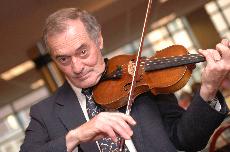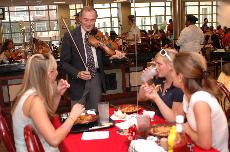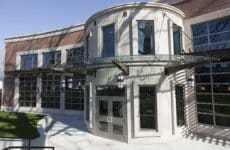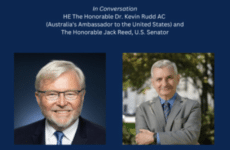By: Rebecca Nasca
Posted In: Entertainment

Photo credit: Public Affairs Office/Salve Regina University
Joseph Ceo

Photo credit: Public Affairs Office/Salve Regina University
Joseph Ceo
A crowd of musicians file into the ballroom of Cecilia Hall, domed 12 feet above by a cracked plaster ceiling. Crystals drip from chandeliers hundreds of years old. Musicians comment again this week that the room is drafty and the yellow lighting is awful for playing. While the practice space leaves something to be desired, the conductor never has.
Players take their seats as Dr. Joseph Ceo calls the room to order beginning rehearsal with a Concertino for trombone and orchestra by Lars-Erik Larson. Ceo explains the dynamics he is looking for, piano because the orchestra can still overpower a trombone. The orchestra takes off, more or less executing his directions. Patiently, every Tuesday night, Ceo leads the Newport County Orchestra through classical and romantic music. His repertoire of music experience is impressive, ranging from conducting his fraternity’s music group at the University of Illinois to a year doctoral research on viola and viola d’amour in Rome, Italy. He is proficient in five different sting instruments: the violin, the viola, the cello, the bass, as well as the viola d’amour. Since his days in graduate school, he has conducted eight separate orchestras. He now conducts two professional orchestras, the Washington Ballet Orchestra and Musica Dolce, in addition to the Newport County Orchestra. Ceo appears in his element steering an orchestra like some massive ship, knowing precisely which strings to pull. You would not know by looking that he also an accomplished pilot of 35 years. He connects the intricate procedures involved in piloting to music, describing flight as “a beautiful process” and “very artistic.” His wife, Joan Harrison Ceo, says he has three loves: music, flying, and gardening. “That’s what he does all summer,” she says. Every summer Ceo grows 25 to 30 pounds of string beans in addition to small tomatoes and peppers. “He’s living the life a lot of string players would want to live,” says Peter Davis, chair of Salve Regina University’s music department. Davis, who has known Ceo in many capacities over the span of 32 years as his music director, his conductor, and his mentor, describes Ceo as an excellent teacher. Davis attributes much of his knowledge in music to Ceo, from conducting to blending the sound of an individual instrument into the greater orchestra. Ceo says he enjoys teaching, though he admits it is taxing. With the many student orchestras he has conducted as well as the community orchestra, he is constantly teaching. “When it gets down to the last couple of rehearsals, you just wonder if it’s all going to come together,” Ceo says. “And you have to hope that the efforts are going to pay off.” Over his life time, Ceo has put all his effort into music, and it has clearly payer off. As a young child Ceo was already surrounded by music with two parents who were musicians and teachers themselves. His father, who played a variety of instruments, directed the high school band and orchestra in their hometown of Wheeling, W. Va. His mother taught piano lessons. When Ceo started playing the violin at the age of 5, his parents drove him an hour to Pittsburg, Pa., for his lessons. Ceo carried on their love for music, continuing to pursue his early musical education through middle school and high school. Music was pretty much always his passion, however, Ceo says if he had not pursued music he would have gone into journalism. While attending high school in Latrobe, Penn. Ceo worked for the school newspaper as a sports writer. Ceo says journalism interested him because “everyone has a story…and most of them are happy stories.” He started his higher education at Carnegie-Mellon University where he received his BA. Ceo says his time at the university was very important, it “taught me how to be a leader. It was that kind of school.” His junior and senior year he directed a music group in his fraternity. He worked his group hard and was rewarded with a trophy for their exploits in a singing competition. Ceo went on to pursue his masters at the University of Illinois. While a graduate assistant, he started conducting his first orchestra at a junior high school when the regular teacher quit three weeks into the school year. Masters degree in hand, Ceo flew across the Atlantic to study in Rome as a Fulbright Scholar, a program which facilitates international educational exchange. There, under the direction of Renzo Sabatini, he did doctoral research on the viola d’amour, a rather uncommon instrument in the same family as the viola with six or seven playing strings and the same number of “sympathetic” strings which are not played but resonate to add an other-worldly sound which gives the instrument its name. Ceo’s time in Rome would be the first of many trips to conduct and perform abroad. Ceo’s wife, Joan, a harpist and teacher of more than 60 years, accompanied him on many of these trips to Europe over the years. Music brought the couple together when they met at Catholic University during a mutual friend’s graduate recital. They have preformed as a duet and a trio, adding flute, all over Europe and America. The Ceos traveled often to Rome and London where they have preformed at the Bach Academy and the Queen Elizabeth Performing Arts Hall. In the fall of 1957, Ceo joined the Air Force. After an audition, he was given his orders: 13 weeks of basic training and a four-year stint the Air Force band. Ceo recalls those 13 weeks being a lot of “tough love.” However, the experiences he had touring with the Air Force Strolling Strings made life interesting for him and his future wife. Joan Ceo recalls he was in Europe just before their wedding in 1961. The Berlin Wall crisis delayed Ceo from retuning to the states when President Kennedy froze all military movements. Soon-to-be-Mrs. Ceo was not sure he was going to be allowed to return in time for the wedding. “In his case they did allow him to get out,” says Mrs. Ceo. “Because they figured that musicians were maybe not critical to the war effort.” Ceo began taking more graduate classes at Catholic University in Washington D.C. After receiving a BMA in music from the university, Ceo accepted his first teaching position in Wisconsin and moved west with his new wife. He taught there for three years then went on to teach at Rhode Island College for two years, conducted in Kentucky for 10 years, and taught at the University of Rhode Island for 17 years. Ceo vividly recalls his time directing the Central Kentucky Youth Orchesta. “The kids were monsters, but very good violin players,” Ceo says. The young violinists enjoyed the selection of music Ceo brought them, especially Gershwin’s “American in Paris.” The group traveled often, visiting cities including Atlanta, Cincinnati, and Pittsburg. In 1968, the youth orchestra was scheduled to perform an April concert at the State Department in Washington, D.C. They arrived to play five days after Martin Luther King Jr.’s assassination. After performing with other music students from D.C., Ceo asked the bus driver to drive down 9th Street, an area which had been the site of riots in reaction to the assassination. He hoped to give his young musicians an education in the way people react in a crisis. Since a childhood characterized by the crisis of World War II, Ceo has harbored an interest in aircrafts. In 1973 he began to pursue his interest and got his pilot’s license. Ceo explained that a year of flight school and yearly re-certifications are required to hold a pilot’s license. He has to prove he can fly by his instruments only in an annual evaluation. Every 6 months he has to complete a flight review where he does the opposite: flying visually with no instruments to aid him. Ceo began arranging music for orchestra in 1989. His score was published through “Luck’s Mucis Library,” a Nutcracker suite for Festival Ballet Rhode Island (now Festival Ballet Providence). Ceo compares the difficult process to writing a book. He started with music that was no longer protected under copy write laws and re-wrote parts for the entire orchestra. In 1992 Peter Davis, one of Ceo’s old students from the University of Rhode Island, encouraged Ceo to start an orchestra to supplement the string program at Salve Regina University. At the time, Davis played bassoon for Musica Dolce, the chamber orchestra Ceo still conducts. Ceo had considered starting a community orchestra and Salve Regina offered the opportune space to do so. Ceo agreed and the Newport County Orchestra was born. Today, Ceo is hard at work finishing preparations for the Newport County Orchestra’s spring concert which will be held on April 29. Ceo looks forward to commemorating and continuing his years as a pilot, musician, and gardener. Ceo is proud to say he has landed in all 50 states. Before Christmas every year he continues to fly the “Susna 206” he bought in 2003, the third plane he has owned, to Washington D.C. nearly every week to conduct the Washington Ballet’s orchestra for their production of “The Nutcracker,” a revolutionary war themed production of the classic story. Ceo will be a guest conductor at a concert honoring the Kentucky Youth Orchestra’s 60th anniversary this year. Since he conducted the orchestra in the 70’s, it has grown into three separate groups and will soon be starting a fourth. For Musica Dolce, he hopes to perform more concerts for children. Ceo expects to apply for a few grants for non-profit organizations in order to put on these concerts. Many musical scores are no longer for sale. For a professional group, this means they have to rent music at a high price, leaving them to rely on grant money and wealthy benefactors for their music, which Ceo is optimistic they will receive. Ceo is considering arranging his own “Swan Lake” suite. He has been approached a few times with interests for a new score. He is not sure he has three months to spend on one piece of music yet. Of course, he would have Mrs. Ceo to help. “We are extremely involved (in each other’s work),” she says. “The daily conversation is almost always about music.” Ceo might try growing eggplant in his garden this year, though they are tricky to grow. They need at least 90 days of warmth to develop properly. “I plan to keep doing the same things, conducting, flying, and gardening,” says Ceo, “hopefully do them better.”













